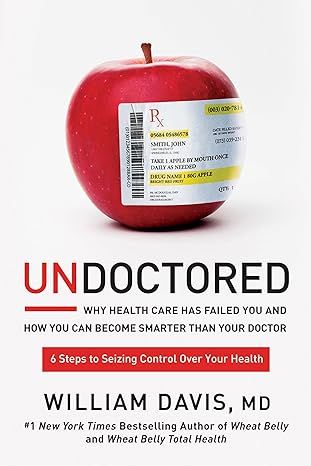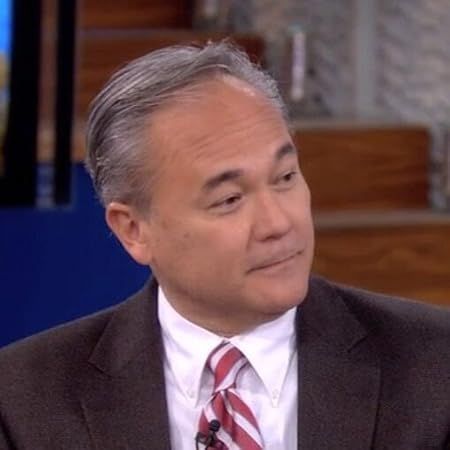Undoctored: Why Health Care Has Failed You and How You Can Become Smarter Than Your DoctorHardcover
4.6
-
1,259 ratings
Conventional health care is no longer working in your favor—but thankfully, Dr. Davis is.
In his New York Times bestseller Wheat Belly, Dr. William Davis changed the lives of millions of people by teaching them to remove grains from their diets to reverse years of chronic health damage. In Undoctored, he goes beyond cutting grains to help you take charge of your own health. This groundbreaking exposé reveals how millions of people are given dietary recommendations crafted by big business, are prescribed unnecessary medications, and undergo unwarranted procedures to feed revenue-hungry healthcare systems.
With Undoctored, the code to health care has been cracked—Dr. Davis will help you create a comprehensive program to reduce, reverse, and cure hundreds of common health conditions and break your dependence on prescription drugs. By applying simple strategies while harnessing the collective wisdom of new online technologies, you can break free of a healthcare industry that puts profits over health.
Undoctored is the spark of a new movement in health that places the individual, not the doctor, at the center. His plan contains features like:
• A step-by-step guide to eliminating prescription medications • Tips on how to distinguish good medical advice from bad • 42 recipes to guide you through the revolutionary 6-week program
Undoctored gives you all the tools you need to manage your own health and sidestep the misguided motives of a profit-driven medical system.
Kindle
$13.99
Available instantly
Audiobook
$0.99
with membership trial
Hardcover
$23.90
Audio CD
$17.44
Ships from
Amazon.com
Payment
Secure transaction
ISBN-10
1623368669
ISBN-13
978-1623368661
Print length
416 pages
Language
English
Publisher
Rodale Books
Publication date
May 08, 2017
Dimensions
6.27 x 1.38 x 9.32 inches
Item weight
1.52 pounds
Product details
ASIN :
B01N2T9HTU
File size :
3665 KB
Text-to-speech :
Enabled
Screen reader :
Supported
Enhanced typesetting :
Enabled
X-Ray :
Enabled
Word wise :
Enabled
Editorial reviews
Review
"America’s 'healthcare' system is anything but. With its dedication to highly monetized interventions, consumers have been relegated to serving as pawns in an impressively profitable paradigm focused on illness, while the notion of keeping us healthy is of little concern. In Undoctored, Dr. Davis explores this revelation, and thereafter, transforms the reader from passive bystander, sitting on the sidelines at the mercy of the system, to an active participant, deeply engaged in the process of regaining and maintaining optimal health. This is a powerfully empowering and life-changing text." —David Perlmutter, MD, FACN, board-certified neurologist and author #1 New York Times bestseller, Grain Brain, and The Grain Brain Whole Life Plan
"Every so often, a new book comes along that dashes well-established, preconceived notions in health. Undoctored strikes at the core of what is systemically wrong with the healthcare system, while offering a solution so simplistic, so achievable, yet so powerful in design that Dr. Davis is inevitably going to face a mountain of naysayers invested in conventional practice.” —Deepak Chopra, New York Times bestselling author and author of You Are the Universe
"What are you going to do about our failing healthcare system, to protect yourself and your family? Are you going to follow the herd and be at risk like the rest of society? Or will you be rational, and learn more? One thing you must do is read this book. I have been a fan of Dr. Bill Davis for over two decades now, and he lays this complicated information out in a sensible way.” —Dr. Tom O'Bryan, author of The Autoimmune Fix
About the Author
WILLIAM DAVIS, MD, is a New York Times bestselling author and a cardiologist who advocates unique, insightful, and cutting-edge strategies to help individuals discover the health hidden within them. His blog wheatbellyblog has been visited by millions of people. Dr. Davis has also shared his passion for wheat-free living on national television shows including The Dr. Oz Show and CBS This Morning. His Wheat Belly Total Health program has become a public television special, now airing nationwide. He lives in Wisconsin.
Read more
Sample
Excerpt. © Reprinted by permission. All rights reserved.
Introduction
I think the biggest innovations of the 21st century will be at the intersection of biology and technology. A new era is beginning. —Steve Jobs
Who doesn’t love a gripping medical drama? Remember the George Clooney character on the TV series ER, pediatrician, womanizer, rebelwith-a-heart Dr. Doug Ross? Add characters like the cane-wielding Dr. Kerry Weaver and lovable nurse Abby Lockhart, and you’ve got the formula for a medical drama that addicted a generation of viewers, portraying health care as fast-paced and thrilling, flawed but well intentioned, and thoroughly human.
But that’s TV—dramatized, idealized, sanitized. The private side of real health care is something altogether different. The bulk of what goes on in health care every day involves no drama, no urgency, no critical life or death decisions, no George Clooney winning smile, no surreptitious kisses in corners of the supply room. Having practiced medicine for over 25 years, I can tell you from personal experience that most health care involves routine, humdrum issues like blood pressure and bloating, bedsores and bladder infections, cost and copay and does not invite good-looking actors to play out drama as gripping as a case of itchy hemorrhoids.
Though as dull as dishwater, health care is big money. In 2014, we spent a total of $3 trillion nationally on health care ($9,523 per person), accounting for 17.5 percent of gross domestic product, compared to the 10 to 12 percent other developed countries spend with healthcare systems that match or exceed the United States in quality. Despite the dominance of glistening medical center images in the popular perception of health care, less than one-third of that total was spent in hospitals. The other two-thirds was spent on such uninspiring expenses as outpatient doctor visits, urinary catheters, and drugs for acid reflux.1
Many modern doctors hold themselves up as all-knowing, capable of managing every aspect of health, from delivery to death, from vaccination to senility. I know because I was guilty of this. The “I’m-the-doctor, you’re-thepatient relationship” has been frozen in time since the days of Hippocrates. Despite the high-tech image, old-fashioned methods are still used to maintain paternalistic authority. Doctoring means wearing a white coat to impress ignorant, helpless patients, the appearance of authority designed to exploit the power of the placebo, long waiting room stays erected as barriers to the privilege of gaining the wisdom of presumed experts, while the monolithic world of medical billing remains impenetrable. All of it seems positively fossilized in an age of immediate information access, on-demand videos, drone deliveries, and the democratization of discussion via social media. Doctors hold themselves up as the gatekeepers of health information and regard the average person as ill-informed and inexperienced, a health simpleton who is powerless in administering any aspect of health. In what other industry can the provider of a service operate with such disregard for customer satisfaction? Imagine buying a car from a salesperson who used intimidation to raise prices, refused to answer questions, and brushed off your concerns as those of a naive automotive nonexpert; I doubt you’d drive off happily in a new hybrid convertible.
The information tide has shifted. Public ignorance in health may have been the rule in 1950, but rapid dissemination of information in our age has usurped this lopsided relationship, making the paternalistic doctor-patient relationship of the past as relevant as trepanation (drilling holes in the skull—yes, a real practice) to treat migraines. You have access to the same information as your doctor. And it doesn’t involve leafing through dozens of thick volumes of the Index Medicus and then having to retrieve a study from dusty stacks of medical journals, like I did during my medical training. The newly leveled playing field of immediately accessible information means that a new clinical study read by your neurologist or gynecologist is available to you with a few mouse clicks. The cultlike, guarded monopoly over health information is long gone, replaced by immediate, widespread information readily accessible to everyone. The resources available to us have exploded. And they continue to increase at an exponential rate.
The growth in medical information means that the education your doctor received during medical school and training is dusty, moth-ridden, and obsolete. Information doubled every 50 years in 1950, every 7 years in 1980, and every 3.5 years in 2010. If current trends continue, it will double every 73 days by 2020.2 And information growth is not just within medicine but also in other areas that impact human health, such as toxicology, due to the proliferation of industrial toxins in the environment that disrupt endocrine health and increase risk for cancer, or environmental science and urban planning, since city noise, smog, congestion, and stress all affect various aspects of health. No living human can keep up with the information load and hope to provide up-to-date health care, no matter how smart, how hardworking, how fancy their equipment, or how many operating rooms they have. Dealing with this boom in health information requires new tools to organize it all, put it to practical use, and extract maximum health benefit.
What if we combined the newly found informational freedom provided by Internet search capabilities with the human feedback tool of social media and the rise in direct-to-consumer testing that circumvents the doctor, then threw in a little benign guidance from sources that do not seek to profit from providing it? You might just be on your way to wielding considerable authority over your own health. When you apply the methods unique to the Information Age, unconcerned with ritual, intimidation, and profit, to your health, some pretty darned incredible things can happen: Weight melts away effortlessly, joint pain and skin rashes recede, acid reflux and irritable bowel syndrome symptoms reverse within days, fibromyalgia and ulcerative colitis begin a powerful retreat, prescription medications become superfluous—all by sharing in a growing collective information exchange.
The healthcare system is marvelous for developing the newest implantable defibrillator at a price tag of $36,000, even though a substantial portion of the people receiving such devices do not need them. But the system is miserable at delivering simple, self-managed nutritional solutions for heart disease.3 The system is ready and willing to commit you to a life of taking drugs and injectable insulin for diabetes, dealing with the eventual heart disease, kidney failure, and peripheral neuropathy with more drugs and procedures, providing “education” designed by people who put commercial interests first, while no one provides the handful of inexpensive health strategies that have been shown to reduce, even fully reverse, type 2 diabetes. You can schedule a double mastectomy next week to avert breast cancer but spend years searching for credible advice on how to minimize exposure to xenoestrogens and organochlorine compounds and reduce inflammatory visceral fat, all of which cultivate cancer. If you are a middle-aged woman, a doctor has likely advised you to start a drug to treat osteoporosis and take it for life, but she likely never mentioned the proven-to-be-effective and inexpensive natural methods that can reverse bone thinning back to normal. In health care, success is measured by the number of surgeries performed and drugs prescribed and lives saved once disease shows itself, but it is almost never measured by the number of times the disease is prevented in the first place.
Unquestionably, there are situations in which doctoring and the healthcare system are needed. If you are bleeding, injured, or struggling to breathe with pneumonia, some old-fashioned suturing, bone setting, or antibiotics can still do the trick. Nobody around here is going to try to replace their own hip joint or treat a urinary tract infection with salves and tonics. There are also situations that are beyond our reach, such as childhood cancer, congenital defects, and lung disease from smoking cigarettes. There are even occasional healthcare professionals who, despite the biases of their education, understand their role as healers, not as cogs in this flawed, profit-seeking wheel. But I’m not talking about those situations. I’m talking about more common and costly (in total) health issues that plague modern humans, from constipation to migraine headaches, from eczema to erectile dysfunction, from acid reflux to plantar fasciitis, from acne to attention-deficit disorder. These are the problems that bore most doctors silly and are certainly never portrayed on TV medical dramas. Doctors are more eager to see exciting, better-paying problems like heart attacks, colon cancer, brain tumors, and kids swallowing peculiar objects. After all, in most hospital healthcare systems of the 21st century, physician pay is tied to hospital revenues, with a bigger end-of-quarter bonus, for example, for generating more MRI scans, surgical consults, organ transplants, and other big-ticket services—regardless of whether they are truly needed or not. (The Institute of Medicine reported that, in 2009 alone, $209 billion was spent on unnecessary medical services and $75 billion was lost to fraud, with many more hundreds of billions lost to inefficiencies, inflated pricing, and excessive administrative costs. The dollars spent on the unnecessary and the dishonest in health care nearly match the total dollars spent by the US military every year.)
But it’s these less-than-interesting health issues for your doctor that are wonderfully and safely reduced, reversed, and—dare I say it—cured by a handful of simple strategies that you can implement on your own. You’ll be spared the annoyances and dangers of the healthcare system, and because you are obviously not trying to profit financially, you will remove layers of unnecessary costs. You will also find personal health challenges far more fascinating to deal with since they involve you.
I got my first taste of the power of individually determined health 25 years ago when, despite being a faculty member at a teaching hospital and having been board certified in internal medicine and cardiology, I inadvertently gave myself type 2 diabetes with severe distortions of cholesterol values and triglycerides when I embraced a strict low-fat, vegetarian lifestyle dominated by vegetables and “healthy whole grains.” I have since reversed all of these dietary disasters by following a few basic health strategies, not a single prescription drug involved. And it was easy.
Let’s be absolutely clear: I propose that people can manage their own health safely and responsibly and attain results superior to those achieved through conventional health care—not less than, not on par with, but superior. Although you may find this proposal brash, if my experiences with thousands of people over the last decade are any indication, most people who adopt a handful of simple strategies gain health that is vastly superior to that obtained through conventional means with drugs and procedures, not to mention the awful message that passes for modern dietary advice. You will learn that the code has been cracked for an astounding and long list of health conditions. I propose that everyday people can achieve startling results without prescription drugs, without hospitals, without medical procedures by largely sidestepping the doctor, using tools that inform, measure, and support self-directed efforts. And it’s relatively easy, inexpensive, safe, and even fun.
This is something that was never before achievable and is part of the rapidly changing landscape of technology. Such an idea would have been impossible, or at least hazardous, just 10 years ago. Only now is it becoming a reality. Empowerment of the individual in health is really just one aspect of broader waves of change that include self-driving cars and the celebration of noncelebrities through reality TV and YouTube (surely you’ve seen “Evolution of Dance” and “Chewbacca Mom”). Computerized autopilot systems have been used to fly and land jetliners for years, technology has powered innovations in health care such as 3-D modeling of drugs and remotely operated robotic surgery, virtual nobodies show off impressive talents for national TV audiences, but modern innovations have not yet been fully exploited to empower the individual in health. Well, the time has come: The tools of technology, coupled with a critical mass of new information and crowd interactive potential, have reached levels that now allow the everyday person to take back personal control over health.
You may find the first four chapters of this book disturbing, even shocking, because that is where I dissect what modern health care has become, viewed over many years from the perspective of an insider. I don’t do this just to point fingers or make you angry. I do this to reveal that what you thought was health care all along was really something different, a mere shadow of what health care should have been, built on outdated practices, cultlike adherence to rules, sometimes the pathological need to control people’s lives, and profit. Only after I raise serious questions about modern health care do we dive into the much more interesting and engaging part of the conversation: how to begin living a life Undoctored. In the how-to part of the book, I share with you my 6-week program, complete with starting recipes, to get you confidently on your way to an Undoctored life, and I include steps to take to reduce or eliminate prescription medications.
Let me also be clear on what this book is not: It will not be a guidebook on how to self-diagnose various diseases, nor will it be a pharmacopoeia of over-the-counter treatments. You will see that the Undoctored process turns the health equation around 180 degrees by providing an approach that first restores head-to-toe health in unexpected ways, reversing numerous health distortions, many of which you are likely unaware that you had, as well as many overt health conditions. Only after this initial process do we veer off in directions that can involve exploring diagnoses and treatments. I will discuss how to distinguish good information from bad, biased advice designed to squeeze more money out of you from safe and unbiased guidance, and I will show you how adhering to a handful of basic ground rules can keep you on course.
Although the healthcare system is typically indifferent to real health outside of revenue-generating activities, never before has the volume of information and tools that could potentially be applied to health been greater. But the system is not equipped to provide such information—nor does it care to—and deliver it to you and your family. These are the roles that I want Undoctored to serve—a catalyst for change, a liberator from the bonds of helpless ignorance that allows conventional health care to thrive, a manifesto and map of the path to achieving something a lot better in health, as much of it as possible without a doctor.
Just as smartphones have transformed human communication—no one sent “selfies” back when Madonna sang “Vogue” or swiped through eligible men or ladies on Tinder—the information and tools of Undoctored, selfdirected health will change the way we think about ourselves, how we achieve health, and our relationship to the healthcare system. They will release you from the stranglehold—yes, stranglehold—that conventional health care has had on people and replace it with health you create on your own, freeing you from the appointments, impersonality, neglect, and expense of what is presently passed off as health care. You haven’t had leeches applied to your arms and legs to bleed you, but you have had to endure something only a bit better to the tune of nearly $10,000 per year, per person. Those days are now over if you simply follow along.
In the subsequent pages of this book, I will discuss why and how such wonderful self-directed strategies are not only possible but essential for you to succeed in health; leave your health up to the doctor and the healthcare system while you submit to their “care,” and you are doomed to a life of following their rules for their gain. The power you hold reaches far and wide into multiple aspects of your and your family’s health: Cholesterol can be reduced without medication, blood pressure controlled, prediabetic blood sugars squelched, just as I and thousands of others have. You can shed 30 pounds in a few weeks (since excess weight is a reflection of distorted health, not just a cosmetic issue), identify and correct thyroid problems, craft a program to prevent or reverse osteoporosis, and amplify energy—all using self-directed resources that are within your reach, many of which you already have. You can share your experiences with others, review the experiences of other likeminded people, and find new solutions to previously unsolvable problems, all without a doctor. And, as the tools and revelations of this new age unfold, that is just the start. Life and health by the end of your 6-week Undoctored program will be unrecognizably transformed, even to the point of drawing startled gasps from people around you.
Spiraling healthcare costs also make self-directed health not just the fascination of early adopters but a necessity, as the increasing costs of the healthcare status quo look like a bubble (and bubbles burst). Should the healthcare system collapse under the weight of its own unsustainable costs, the self-directed health movement will be catalyzed as individuals are forced to bear more costs through larger insurance deductibles, flex-spending, and medical savings accounts. As control over more of the healthcare dollar is returned to consumers, they will seek to spend more wisely and look for solutions that don’t involve costly medical services. Cost savings will be realized as consumers take on more healthcare responsibility and avoid expensive doctors, prescriptions, and hospital services made unnecessary and counterproductive by our efforts.
As economically disastrous as spiraling healthcare costs are, you should also recognize that increasing costs are quietly celebrated by the healthcare industry, as they pocket the increased revenue. They have little incentive to fix this flawed healthcare system because your losses are their gains. Drug companies, medical device companies, doctors, hospital systems, health insurers— they all take their piece of this expanding pie, the pie that you and your family sacrifice to provide. Solutions to all the problems—cost, access, providing only as much care as is beneficial—are unlikely to come from within, so we provide the solutions that allow us to view health care as largely an option, not a necessity for the majority of health issues.
I predict that your Undoctored efforts will dramatically reduce your need for health care while helping you to feel better (and even look better) and sparing you from hundreds of health issues. They will, in effect, allow you to opt out of most aspects of health care. If you can’t beat them—don’t play the game, and win the game by playing by your own rules.
The ultimate cost savings emerge when you don’t develop a disease in the first place or succeed in reversing chronic issues like acid reflux or high blood pressure on your own. The first year of not having acid reflux, for example, can save $2,000 in healthcare costs that year alone because you did not undergo the obligatory (and often unnecessary) endoscopy and were not prescribed the stomach acid–blocking medications that would have led to distortions of bowel flora and the associated bloating, constipation, intermittent bowel urgency, and inflammation, as well as loss of bone density and nutrient deficiencies, downstream health problems resulting from what is often regarded as a “benign” drug treatment. Instead, you institute simple measures that not only address the cause of the problem but also bring about other health benefits without causing unwanted side effects. And your approach costs, at most, a few dollars, or even results in saving money.
You are, in effect, failing to contribute to the physicians, nurses, dietitians, technicians, hospital executives, pharmacies, prescription management services, armies of salespeople, pharmaceutical executives, and medical device manufacturers that would have otherwise pocketed the money you would have been forced to spend. Multiply this cost savings by thousands, then millions, of people for just this one condition and you get a sense of what we could achieve if we persuaded the population to follow us and cut a path of health across hundreds of health conditions.
And we would also create a nation of healthy, slender, vibrant people who rely less on a bloated, profit-seeking healthcare system that costs more than any other system in the world. We would all come to view the healthcare system as nothing more than an acute and catastrophic service available when its services are needed—while we manage our own health safely, effectively, and inexpensively, doing it better than a system that places profit ahead of results.
I will explain how and why I chose to cultivate this daring path. In truth, I did not set out to develop a program that seized control over health or saved money. As with many things, it all happened through a series of fortuitous accidents, coupled with a desire for better answers, all unfolding on the cusp of an exciting and empowered Information Age. But, lo and behold, we (my development team and I) inadvertently created a system for dealing with a huge swath of health issues on our own—the first time in thousands of years that the traditional notion of doctor-patient relationship has been completely overhauled. And I think that Hippocrates would approve.
Along the way, I’ll share some of the stories of people who have engaged in such an Undoctored process and achieved results that, just 20 years ago, would have been impossible, examples of people who seized the reins of health on their own and succeeded in some pretty big ways.
I will describe the basic requirements that virtually everyone should follow, practices that apply to everyone regardless of age: males; females; Democrats; Republicans; people who are tall, short, skinny, or overweight; those with gastrointestinal issues, autoimmune conditions, type 2 diabetes, or other diseases; and people who want to avoid such conditions in their lifetimes and just be healthy and function at their highest level. We will have to discuss the boundaries, where your Undoctored health efforts end and conventional health care picks up, including the role of your doctor in this new world.
I present the Undoctored discussion in three parts. In Part I, I go into detail on how and why the healthcare system, from doctors to agencies that pose as health advocates, fails in providing health or reliable health information. Recognizing unreliable or misleading health information is the first step in declaring yourself Undoctored. In Part II, I will take you full steam ahead into the world of Undoctoring, revealing the rationale and the essential tools needed to adopt this exciting life approach. In Part III, I discuss the foods, nutritional supplements, and other strategies of the Undoctored way of living in detail, laid out for you as a 6-week program, the amount of time required to have health and life transformed and be well on your way to freeing yourself from the bonds of the healthcare system.
Turn on the reading light, get cozy in your chair, grab the remote to switch off the medical drama airing on TV, and prepare to be enlightened and know that your future will be brighter and healthier, all because you decided that you’ve had enough of being a source of profit for the healthcare system while never really receiving health in return and that you are going to take back control over your health and fate, all Undoctored.
Read more
About the authors
William Davis
Dr. Davis provides solutions to health problems by addressing the microbiome, massively disrupted in modern people. He shows readers in his Super Gut book, for instance, how to restore important lost microbes lost such as Lactobacillus reuteri, restored by using a unique method of yogurt fermentation that smooths skin and reduces wrinkles, restores youthful muscle and strength, deepens sleep, reduces appetite and provides many other youth-preserving and anti-aging effects. In Super Gut and in his website, www.DrDavisInfiniteHealth.com, he provides additional do-it-yourself-at-home strategies for benefits such as improved mood, improved athletic performance, better sleep, heightened immunity, and improved body composition.
Dr. William Davis is also responsible for exposing the incredible nutritional blunder made by "official" health agencies: Eat more "healthy whole grains." The wheat of today is different from the wheat of 1960, thanks to extensive genetics manipulations introduced to increase yield-per-acre. Eliminating wheat yields results beyond everyone's expectations: substantial weight loss, correction of cholesterol abnormalities, relief from inflammatory diseases like arthritis, better mood, reduced blood sugar with many type 2 diabetics being freed of insulin and other drugs, all articulated through his Wheat Belly series of books. He is also a champion of individual self-directed health, as discussed in his Undoctored book.
Dr. Davis lives what he preaches, not having indulged in a wheat-containing bagel, ciabatta, or pretzel in many years, while consuming various fermentation products that yield unexpected health benefits. Dr. Davis lives in Milwaukee, Wisconsin.
Read more
Reviews
Customer reviews
4.6 out of 5
1,259 global ratings
Cheryl A. Reynolds
5
I can't recommend this book highly enough
Reviewed in the United States on August 2, 2017
Verified Purchase
I can't recommend this book highly enough. I was already familiar with Dr. Davis's dietary plan via his Wheat Belly and Wheat Belly Total Health books, but this book takes things one step further and explores the vagaries of the current "health care" system in America, and how it has evolved into nothing more than a profiteering scam. The health care system has no incentive to actually teach people how to be healthy...their business is treating the sick--that is how they make their money. Following the dietary and health advice of prestigious groups like the American Heart Association, American Diabetes Association, Food and Drug Administration, etc. is no longer prudent. They may sound like benevolent groups, but in reality, they are supported in large part by donations from pharmaceutical companies, agriculture lobbyists and manufacturers of processed foods. Studies that your physician quotes to you as to why you should be taking a statin medication or why you should eat a low fat diet and more "healthy whole grain" were sponsored in large part by those same pharmaceutical and food lobbyist groups and have had the statistics twisted to profit those companies.
Dr. Davis is taking us into the future of healthcare...where YOU are responsible in large part for your health, not your doctor. Not your insurance company. And he tells you how to navigate all the new technology and information available now to anyone--not just to those with medical training. He's not a conspiracy theorist nutjob. He does NOT tell you to skip your yearly physical, your screening colonoscopy or mammogram, and is not an anti-vaxxer, or the snake oil salesman who tells you to take turmeric for your new cancer diagnosis or the root of some South American plant for your eczema! Not at all. Dr. Davis helps you to ask the right questions of your doctor. He helps you to lose the attitude that "doctor knows best" because in reality, many doctors don't know much at all about actual nutrition, about current studies that are NOT supported by drug companies, and for the most part, their goal is to see as many patients as possible and tick off your compliance that their employer and your insurance company requires of them.
Dr. Davis is a practicing cardiologist who has worked for decades within this American health system and, prior to his own enlightenment, preached the "follow a low fat diet and take this statin" form of cardiology and then was happy to perform a very lucrative angioplasty with a couple of stents when it didn't work. He has seen this system from the inside and knows how it works. He's also a Type 2 diabetic himself who has virtually 'cured' himself (and thousands of his patients and online community) by following his dietary and total health plan as outlined.
Mind you, I was not someone who needed a lot of convincing--in essence, as a nurse who has also seen the health care system from the inside and has grown increasingly troubled by what I'm seeing--really, Dr. Davis was preaching to the choir with me. I've been following a form of his eating plan for years, off and on--grain-free, sugar-free and mostly "Paleo" without a lot of processed foods, artificial sweeteners and such. But his plan takes it up a notch for me and I intend to adapt my current way of eating to his plan in the hopes of getting rid of more of my prescription medications and becoming as healthy as I can. Truly healthy, not just healthy on paper.
If you are someone struggling with chronic illness and take a handful (or two??) of meds for things like Type 2 diabetes, high blood pressure, cholestrol, acid reflux, osteoporosis, various autoimmune diseases, depression, anxiety, sleep disorders, IBS...I strongly encourage you to give this book a read. Dr. Davis also has a lot of very informative videos on YouTube and there are literally thousands of testimonials from people who have followed his plan and become mostly "Undoctored." Meaning...they need a doctor if they fall and break a leg, or to perform an appendectomy or to do their screening colonoscopy, but they don't need a doctor to write them prescriptions any more. I think that many people start this program not necessarily because they want more health, but because they want to lose weight. It is touted as a weight loss plan, because that DOES happen. Often people start it as a 'diet' and do lose weight...but when the other health benefits become evident within just a short time, people stick with it.
As Glinda, the good witch of the north says in The Wizard of Oz, "You had the power all along, my dear." Dr. Davis helps to show you how to use it.
Read more
115 people found this helpful
Steph
5
Exciting and encouraging! Absolute MUST-READ.
Reviewed in the United States on March 8, 2018
Verified Purchase
I've followed Dr. Davis on and off since about 2009, after learning I had cancer, GERD, Barrett's esophagus, was insulin resistant and severely hypothyroid. I went all organic, tried Atkins for a while, which morphed into basic LCHF eating, dabbled in Zero Carb (fail!) followed by primal/paleo, followed by gluten-free (following advice to treat my Hashimoto's thyroiditis). I did well on LC and paleo, but gained all the weight back when I tried to go gluten-free but using commercially available products. It didn't take me long to realize that the GF products I was consuming were hurting me badly, health-wise. My blood sugars soared and inflammation was obvious. Severe plantar fasciitis resulted in achilles tendon surgery in 2016. With a basic underlying understanding of low carb WOE, I knew I had derailed myself badly. At 62, I can't afford to be ignorant about my health (nor trust "conventional medical wisdom and doctors") if I wish to live another decade or so and watch my grandchildren grow up.
I'm glad I followed him on FB and Twitter, because otherwise I would not likely have learned about this book. It encapsulates everything I have learned on my own over the past several years. I naturally love anything high tech, and because I have a fair amount of medical knowledge (having worked in medicine both veterinary and human, including chiropractic and naturopathic) this book resonated with me on every page.
This book should be recommended reading for every adult regardless of health status. If you're already healthy, Undoctored will help you remain that way. If you are not, Undoctored will give you the tools you need to reclaim your health.
Bravo, Dr. Davis, for saying what most other health professionals will not.
Read more
40 people found this helpful
Hindemith
5
This book is life changing!
Reviewed in the United States on June 19, 2017
Verified Purchase
This book is life changing!
Well written and very informative. I now finally understand what happens to the body with an excess carbohydrates. I should have known from all the reading I have done on nutrition over the years, but this book finally hammered it down for me. I now understand why - even practically starving myself to loose weight - the belly fat remains.
I have been on Paleo diets before where grain was completely eliminated, and I am one of those individuals who do not seem to experience grain withdrawal symptoms. But within the first week of starting the "Undoctored" lifestyle, I have not only lost weight but have also noticed that I have less inflammation ... I don't have a puffy appearance anymore and the slight edema I noticed in my ankles when overdoing the carbs and salt on the typical Western diet has now vanished. In less than one week! So I know it is working for me. My blood pressure has come down by 10 points in the first week alone. I'm sold!
I've read countless books on nutrition and this one is hands-down my favorite. Thank you!
Read more
21 people found this helpful
Terre
5
Educate Yourself on What Ails You and How You Can Reverse It
Reviewed in the United States on July 25, 2017
Verified Purchase
This book is for everyone:
- if you suffer from, or are at high risk for a chronic, non-infectious disease (like heart disease, diabetes, asthma, IBS, acid-reflux, arthritis, etc.).
- if you're interested in true HEALTH care (as opposed to traditional SICK-care practices in this country), that will ward off chronic ailments typically chalked up to "aging"
- if you want to look and feel the best you ever have, which includes dropping weight without hunger, as well as destroying that 'urge to binge' that plagues so many, especially women
Been following Dr. Davis since I read the original Wheat Belly in 2012, and since have read countless other doctors and blogs etc. that all pattern on similar regime: LCHF (low carb, high fat). But UNdoctored is much more than that, especially for those trying to recover or reduce risk from chronic diseases. In a nutshell, core strategies are:
- Eliminate ALL grains and greatly reduce or eliminate added sugar
- Restore Vitamin D to optimal levels (not your doctor's typically very low recommendation)
- Take Omega-3 Fatty Acids as Fish Oil
- Supplement Magnesium
- Ensure Thyroid Status is normal
- Manage bowel flora (take probiotic / prebiotic )
But dropping the crappy carbs is #1 Key. There are ~ hundreds of sites and doctors today advocating similar principles (Dr. Peter Osborne (No Grain, No Pain), Dr. Mark Hyman (Eat Fat, Get Thin; and Blood Sugar Solution), Dr. David Perlmutter (Grain Brain), also Gary Taubes (Why We Get Fat – GREAT book explaining that excess body fat is a symptom, not a result, of the grain, sugar, and crap carbs we eat), etc.
Other marketers include: DietDoctor, Mark Sisson, Whole30, Paleo, Keto diet, which is very low carb (so many websites/books on this); South Beach, Atkins, etc. All fall under the umbrella of LCHF – low carb/high fat. It's so difficult to adopt this way of eating from our current food supply because Big Pharma and Big Agra (agriculture) keep each VERY rich making us sick with poor food choice availability, and then treating those symptoms with VERY expensive drugs.
Educate yourself!
Read more
52 people found this helpful
melstero
5
A way to take charge of your health instead of relying on the medical industry...
Reviewed in the United States on March 22, 2018
Verified Purchase
I read this book in June 2017 and started eating in the "Undoctored" fashion in July 2017. I agree with many things Dr. Davis says - that modern medicine and our government do little to help us stay healthy and prevent illness. I have Crohn's disease and am fortunate that I am generally in remission but I have other health issues and wondered if this way of eating would help. After 2+ months of eating "Undoctored" I had the best colonoscopy I have ever had - and I've had 10 colonoscopies in the last 20 years. Very few polyps (this was a first) and a few very minimal spots of active Crohn's - less than in my previous colonoscopies. This is a very dense read but I am sold on this way of eating. I feel better and my colonoscopy results support the benefits for me of this way of eating. If you have any immune system issues, it's certainly worth a try. I have become less impressed with what Dr. Davis is currently doing - his blogs and recipes are all about the packaged products he sells on the Wheat Free Market. The "Undoctored" lifestyle does require an investment of time and effort to understand the philosophy and to find and prepare recipes that work with this way of eating. You will need to make most of your food from scratch. But once you get the hang of it, there are lots of websites and recipes online that will give you a variety of options. I was at the point where I was ALWAYS dealing with some health issue and was willing to make dramatic changes to feel better. I don't really think gluten is my biggest issue - I think soy and additives/chemicals are more of an issue for me. But with all of the genetically modified foods these days, who know?" If you have chronic health issues, this is worth a try to see if it helps you.
Read more
14 people found this helpful
Top William Davis titles
View all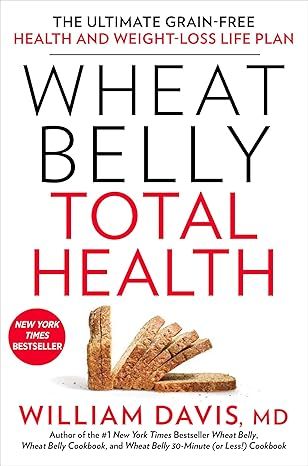
Wheat Belly Total Health: The Ultimate Grain-Free Health and Weight-Loss Life Plan
4.4
-
1,589
$9.99
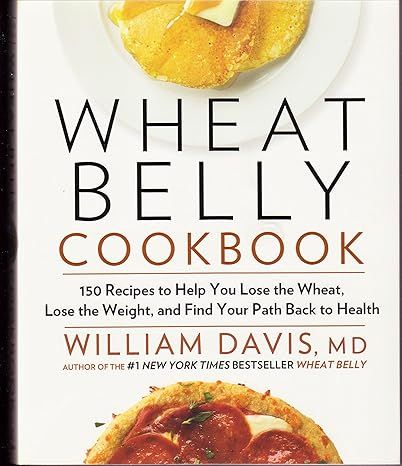
Wheat Belly Cookbook: 150 Recipes To Help You Lose The Wheat, Los
4.4
-
2,474
$1.75
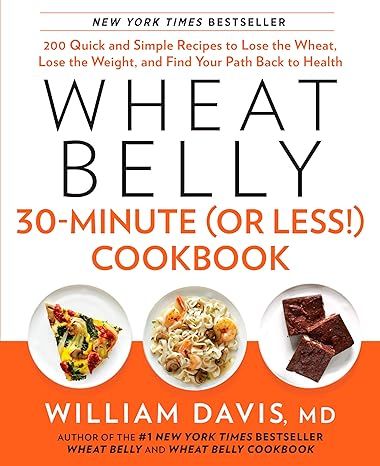
Wheat Belly 30-Minute (Or Less!) Cookbook: 200 Quick and Simple Recipes to Lose the Wheat, Lose the Weight, and Find Your Path Back to Health
4.4
-
2,446
$8.99
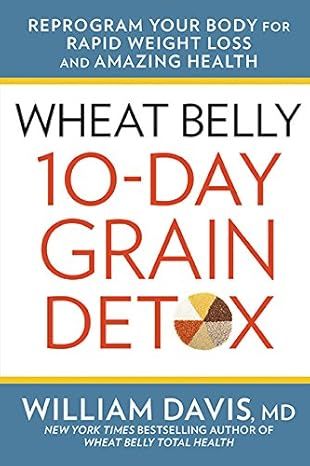
Wheat Belly 10-Day Grain Detox
4.4
-
1,229
$3.94
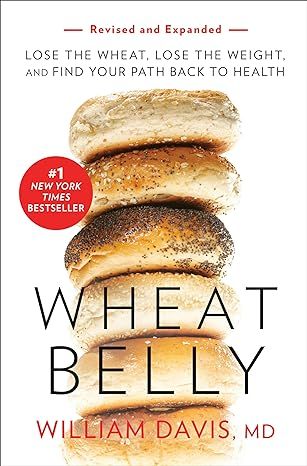
Wheat Belly (Revised and Expanded Edition): Lose the Wheat, Lose the Weight, and Find Your Path Back to Health
4.6
-
2,034
$8.99
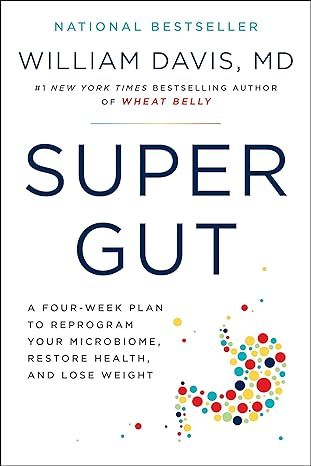
Super Gut
4.6
-
1,959
$0.99
Best Sellers
View all
The Tuscan Child
4.2
-
100,022
$8.39

The Thursday Murder Club: A Novel (A Thursday Murder Club Mystery)
4.3
-
155,575
$6.33

Sapiens: A Brief History of Humankind
4.6
-
140,302
$13.49

The Butterfly Garden (The Collector, 1)
4.3
-
88,556
$9.59

Things We Hide from the Light (Knockemout Series, 2)
4.4
-
94,890
$11.66

The Last Thing He Told Me: A Novel
4.3
-
154,085
$2.99

The Perfect Marriage: A Completely Gripping Psychological Suspense
4.3
-
143,196
$9.47

The Coworker
4.1
-
80,003
$13.48

First Lie Wins: A Novel (Random House Large Print)
4.3
-
54,062
$14.99

Mile High (Windy City Series Book 1)
4.4
-
59,745
$16.19

Layla
4.2
-
107,613
$8.99

The Locked Door
4.4
-
94,673
$8.53
